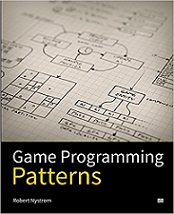
|
FreeComputerBooks.com
Links to Free Computer, Mathematics, Technical Books all over the World
|
|
- Title: Game Programming Patterns
- Author(s) Robert Nystrom
- Publisher: Genever Benning, 1 edition; eBook (Updated Continuously)
- Paperback: 354 pages
- eBook: HTML and PDF
- Language: English
- ISBN-10: 0990582906
- ISBN-13: 978-0990582908
- Share This:

|
The biggest challenge facing many game programmers is completing their game. Most game projects fizzle out, overwhelmed by the complexity of their own code. Game Programming Patterns tackles that exact problem. Based on years of experience in shipped AAA titles, this book collects proven patterns to untangle and optimize your game, organized as independent recipes so you can pick just the patterns you need.
About the Authors- Robert Nystrom has programmed professionally for over twenty years, about half of which is in games.
- Computer and Video Game Programming
- Software Design Patterns
- Human-Computer Interaction
- Computer and Machine Vision

- Game Programming Patterns (Robert Nystrom)
- The Mirror Site (1) - PDF
- The Mirror Site (2) - PDF
- The Mirror Site (3) - PDF
-
 Game AI Pro: Collected Wisdom of Game AI Professionals
Game AI Pro: Collected Wisdom of Game AI Professionals
Presents state-of-the-art tips, tricks, and techniques drawn from developers of shipped commercial games as well as some of the best-known academics in the field, acts as a toolbox of proven techniques coupled with the newest advances in Game AI.
-
 Design Patterns of Successful Role-Playing Games
Design Patterns of Successful Role-Playing Games
In a Role-Playing Games (RPG), users control a character, usually in the game's imaginary universe. This book contains patterns, both good and bad, gleaned from a study of many traditional and cutting-edge role-playing games. Game Summaries are also included.
-
 Build Your Own First-Person Shooter in Unity
Build Your Own First-Person Shooter in Unity
Making a fast-paced 3D action game needn't be as daunting as it sounds. This book will take you step-by- step through the process of making Zombie Panic using Unity: a frenetic battle for survival inside a castle heaving with the undead.
-
 The Art of Computer Game Design (Chris Crawford)
The Art of Computer Game Design (Chris Crawford)
This book is one of the pioneer works seriously about video game. It talks about such topics as what is a game, why people play games, and how to design a game, all about the foundational skills behind the design and architecture of a game.
-
 A Beginner's Guide to Understanding Game Hacking Techniques
A Beginner's Guide to Understanding Game Hacking Techniques
Game hacking allows you to add functionality and change how games work. Whether your goal is to add a new unit to an RTS game or create an aimbot for a FPS game, this book will teach you what you need to become a true game hacker.
-
 Game Design with AGS (Dave Ensminger, et al)
Game Design with AGS (Dave Ensminger, et al)
Adventure Game Studio (AGS) is an open-source tool which is best for creating graphic point and click style adventure games. AGS provides all the tools you need to make a complete game, including graphics, sounds and scripting.
-
 Designing Virtual Worlds (Richard A. Bartle)
Designing Virtual Worlds (Richard A. Bartle)
This book is the most comprehensive treatment of Virtual World design to-date from one of the true pioneers and most sought-after design consultants. It brings a rich, well-developed approach to the design concepts behind virtual worlds.
-
 More than a Game: The Computer Game as Fictional Form
More than a Game: The Computer Game as Fictional Form
This book considers the computer game as a new and emerging mode of contemporary storytelling, discusses questions of narrative and realism in four of the most significant games of the last decade: Tomb Raider, Half-Life, Close Combat and SimCity.
-
 3D Game Shaders For Beginners (David Lettier)
3D Game Shaders For Beginners (David Lettier)
Interested in adding textures, lighting, shadows, normal maps, glowing objects, ambient occlusion, reflections, refractions, and more to your 3D game? Great! Below is a collection of shading techniques that will take your game visuals to new heights.
-
 Co-creating Videogames (John Banks)
Co-creating Videogames (John Banks)
Drawing on a decade of research within the industry, it offers a rich description and analysis of the emerging participatory, co-creative relationships within the videogames industry, and valuable insight into the growing world of video games.
-
 Code the Classics – Volume 1 (David Crookes, et al.)
Code the Classics – Volume 1 (David Crookes, et al.)
This book not only tells the stories of some of the seminal video games of the 1970s and 1980s, but shows you how to create your own games inspired by them using Python and Pygame Zero, following examples programmed by Raspberry Pi founder Eben Upton.
-
 MonoGame Role-Playing Game Development Succinctly
MonoGame Role-Playing Game Development Succinctly
For MonoGame developers looking to build their own role-playing game, this ebook is an essential guide. It breaks down design complexities into smaller topics that are easy to think through to help you produce a working game.
-
 Game Programming (Penn Wu)
Game Programming (Penn Wu)
This book is to help students to learn fundamental principles that apply to game programming regardless of the language they use to create the game, like gathering input from users, processing game data, and rendering game objects to the screen.






